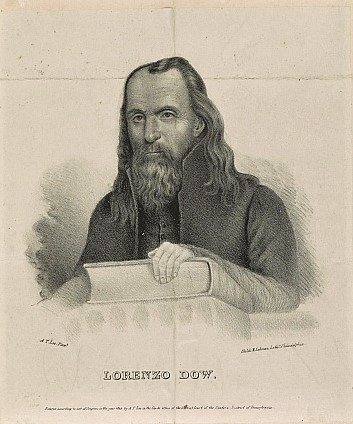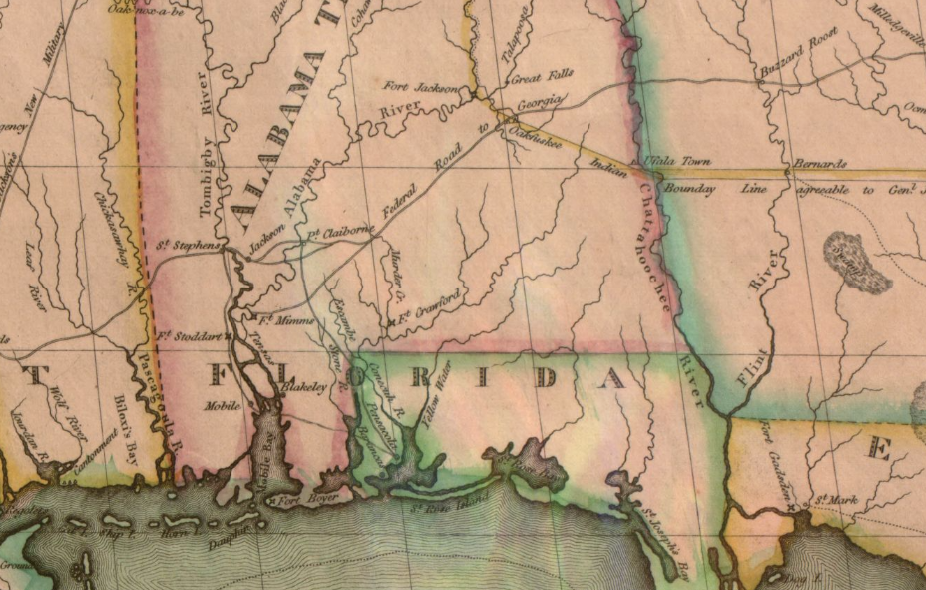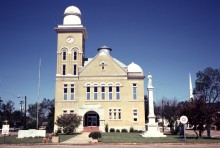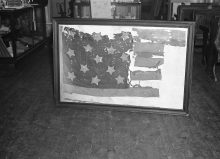First Protestant Minister
and
Early settlers of Washington County, Alabama
(Excerpt from: The Great Southeast or Clarke County and its Surroundings, pub. 1882
by Rev. T. H. Ball)
In 1803, the noted LORENZO DOW came to proclaim, as the first Protestant minister in the area of the Tensaw Boat Yard to the Tensaw settlers.
A digest of various laws for the Mississippi Territory was adopted and approved the tenth of February 1807. Among these was one regulating the marriage ceremony. Any ordained minister must first produce to the Orphans Court of some county in the territory credentials of his ordination, and of his living in regular communion with his society, and obtain from that court a testimonial authorizing him to solemnize marriage, that testimonial to be granted at the discretion of the court. Pastors however of any society might join together in marriage members of their own society according to their own regulations. The territorial legislators seem to have been sufficiently strict in their requirements from ministers to enable them legally to marry the young people of the river settlements, who had been accustomed for so many years easily and securely to marry themselves. But ministers in these same river settlements were as yet very few.
The hour of opening and closing elections in the Territory was fixed thus, to take effect after 1808: That the sheriffs shall open the elections “at twelve of the clock in the forenoon; and shall close at the hour of two in the afternoon, on the subsequent day.”
A strict law against bribery had previously been adopted, providing that any representative elected in the Territory who should “directly or indirectly give, or agree to give, to any elector, money, meat, drink, or other reward, in order to be elected, or for having been elected, for nay county, shall be expelled, and forever after disabled from holding any office of profit or trust under the government.”
Washington County, Alabama
Among the laws of 1807 was also an act for laying out a town in Washington county near Fort St. Stephens, (the streets to be not less than one hundred feet wide,) on the lands of EDWIN LEWIS; JOHN BAKER, JAMES MORGAN, and JOHN F. McGREW, being appointed commissioners to lay out this town. BREWER, not recognizing any French occupancy here, says, that St. Stephens was first settled by the Spaniards who built a fort about 1786. PICKETT says that St. Stephens was laid off into town lots in 1807, and that a road was cut to Natchez. An act was also passed to incorporate the Mississippi Society for the acquirement and dissemination of useful knowledge. Also an act to establish Jefferson College. In the same year the town of Natchez was incorporated and made a city. Also, HARRY TOULMIN, JAMES CALLER, and LEMUEL HENRY, were appointed to locate and open a road from NATCHEZ to Fort Stoddart. From these various acts it is evident that settlements had increased and that civilization was advancing.
1810 map of Federal road across Alabama St. Stephens to Georgia
At this time the cultivation of cotton was rapidly taking the place of the older product indigo; the raising of indigo on the old Spanish and British plantations having been abandoned…….. The inhabitants of this wilderness were now becoming strongly, in feeling and action, Americans; for in this year of 1807, after the attack by the British on the American vessel the Chesapeake, JAMES McGOFFIN, already a resident here, having drafted some patriotic resolutions, the inhabitants, “both whigs and tories, participated in an animated public meeting at Wakefield, pledging their support to the United States, to avenge” this outrage. In 1810 the patriotism of these river settlements took a new direction. They had suffered many annoyances from the presence of the Spaniards below them, and an expedition was planned for driving them out of Mobile. Troops were raised, boats were loaded with provisions, and the volunteer soldiers passed from the Boat Yard down the Tensaw river. The expedition was not well managed and was unsuccessful, and the settlers soon found nearer home abundant use for all their military skill and munitions of war, leaving the final expulsion of the Spaniards to the General Government.
Where Do I Start?: HINTS and TIPS for BEGINNING GENEALOGISTS with ONLINE RESOURCE
Do you need some guidance in your genealogy search? Save time and avoid pitfalls in your research. This book provides simple, no-nonsense instructions to help you get started. Many FREE research links included. Where Do I Start is filled with Hints and Tips to begin your family genealogy research and acquire Genealogy information.
- WHERE TO FIND – on-line resources, experienced genealogists will not be aware of many of these.
- COURT RESEARCH – how to do court house research, where to find birth, death, social security records free on-line.
- EIGHTY – ONE QUESTIONS – you should ask your elderly loved-ones before it’s too late.
- TIPS ON BREAKING DOWN THE WALL – Everyone faces some difficulties in research, often called a ‘brick wall’ but WHERE DO I START? provides suggestions for overcoming them.








Lorenzo Dow was orginially from CT and at one point lived up the road from where we currently live in Montville. He certainly did get around.